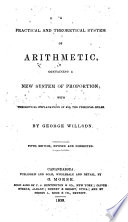 | George Willson - Arithmetic - 1838 - 194 pages
...lowest terms. Ans' It is obvious, that either multiplying or dividing both the numerator and denominator of a fraction by the same number, does not change its value. Thus, .£ multipled continually by 2 becomes \ , A, f%, J-|, |f, 1^, and so on ; in .which series,... | |
 | John Husband (math. master, Berwick.) - 1841 - 126 pages
...may be considered a fraction whose denominator is 1 ; thus, <,-';. 2. Multiplying or dividing both terms of a fraction by the same number, does not change its value. REDUCTION OF VULGAR FRACTIONS. I. To reduce a mixed number to an equivalent improper fraction. RULE... | |
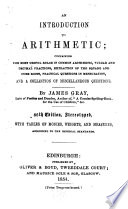 | James Gray - Arithmetic - 1854 - 120 pages
...whole number may be expressed like a fraction, by writing 1 under it. 2. Multiplying or dividing both terms of a fraction by the same number does not change its value. REDUCTION OF VULGAR FRACTIONS. PROB. l. To reduce a fraction to its lowest terms. RULE. Find a common... | |
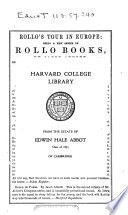 | James Stewart Eaton - Arithmetic - 1857 - 376 pages
...nuT mcrator and denominator of this complex fraction, -, by 7, we 7 obtain J ; but multiplying both terms of a fraction by the same number does not change its value (60, Cor.), .-.- = £; ie the reciprocal of f is £ ; and, generally, the reciprocal of any fraction... | |
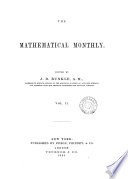 | 1860 - 462 pages
...a Common Denominator. — After the pupil has thoroughly learned that multiplying or dividing both terms of a fraction by the same number does not change its value, he is then prepared to learn how to reduce fractions to a common denominator. The following process... | |
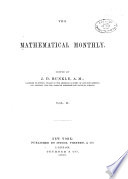 | John Daniel Runkle - Mathematics - 1860 - 460 pages
...a Common Denominator. — After the pupil has thoroughly learned that multiplying or dividing both terms of a fraction by the same number does not change its value, he is then prepared to learn how to reduce fractions to a common denominator. The following process... | |
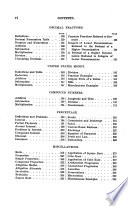 | James Stewart Eaton - 1862 - 320 pages
...numerator and denominator of this complex fraction, -, by 7, we 7 1 obtain 1-; but multiplying both terms of a fraction by the same number does not change its value (Art. 84, a), .-. -= £; 5. e. T the reciprocal of ^ is £ ; and, generally, the reciprocal of any... | |
 | Edward Brooks - Arithmetic - 1863 - 350 pages
...ij- Therefore, oto. SOLUTION 2n. — Since, by Prop. V., multiplying both numerator and denominator of a fraction by the same number does not change its value, we multiply both terms by the number which will give the required denominator, which we find to be... | |
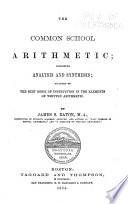 | James Stewart Eaton - Arithmetic - 1864 - 322 pages
...both numerator and denominator of this complex fraction, -, by 7, we obtain £ ; but multiplying both terms of a fraction by the same number does not change its value (Art. 84, a), .*. - = £; ie the reciprocal of £ is J ; and, generally, the reciprocal of any fraction... | |
 | Stoddard A. Felter - Arithmetic - 1868 - 238 pages
...the most convenient denomination.* • Twelfths. ILLUSTRATION. FORM. — Multiplying or dividing both terms of a fraction by the same number does not change its value ; hence if the terms of f are multiplied by 4, and the terms of | are multiplied by 3, the resulting... | |
| |